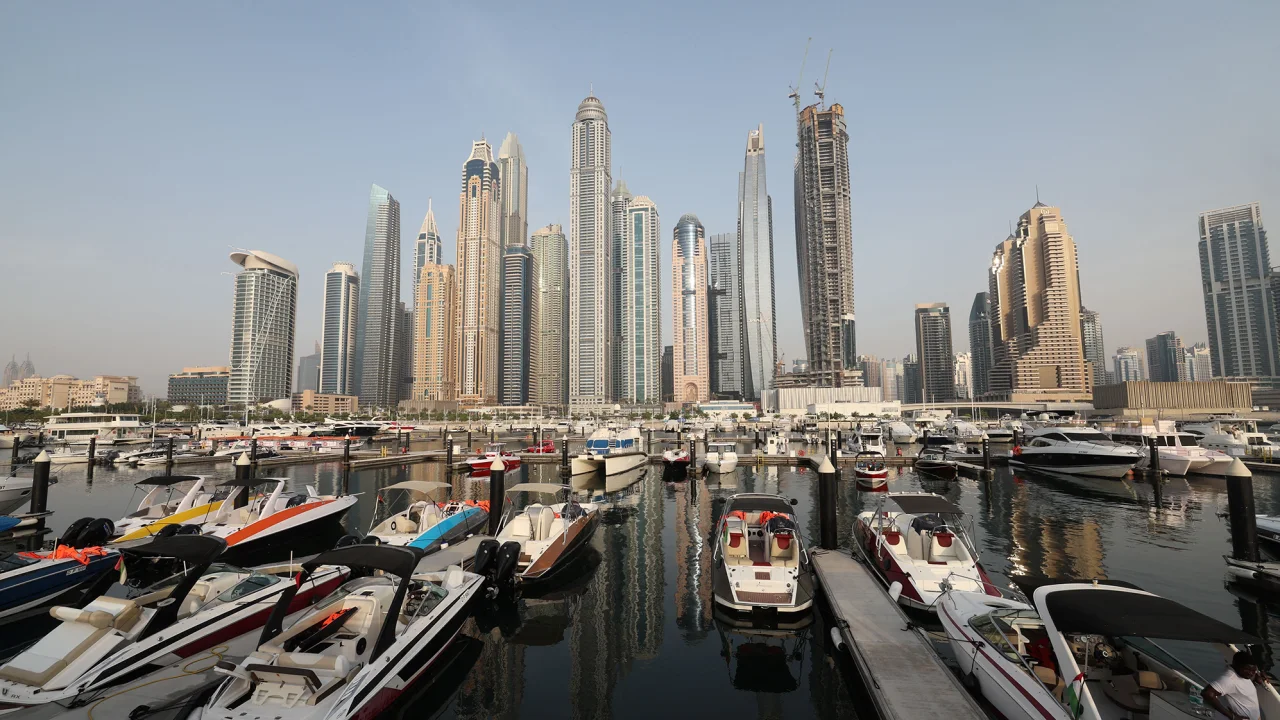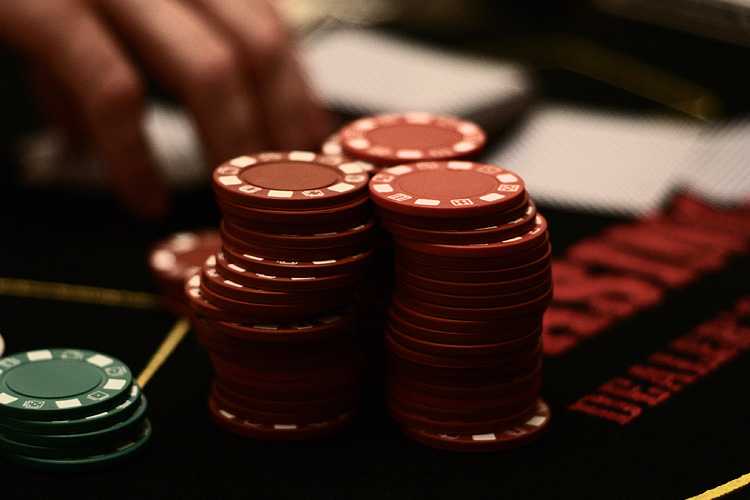How To Stay Within The Legal Limits Of Gambling In Dubai
Dubai, the dazzling jewel of the United Arab Emirates, captivates the world with its towering skyline, luxurious lifestyle, and cultural richness. Amidst the opulence, one facet remains enshrouded in a veil of legality and cultural considerations – gambling in Dubai.
Author:Scarlet SunsetReviewer:Luna ShadowsongDec 11, 202314.3K Shares286.1K Views

Dubai, the dazzling jewel of the United Arab Emirates, captivates the world with its towering skyline, luxurious lifestyle, and cultural richness. Amidst the opulence, one facet remains enshrouded in a veil of legality and cultural considerations – gambling in Dubai.
In a city synonymous with excess and indulgence, the landscape of gambling unfolds as a complex tapestry of regulations, exceptions, and the delicate dance between tradition and modernity.
This exploration navigates the intricate web of gambling in Dubai, shedding light on its legal nuances, the allure of forbidden games, and the digital frontier where technology meets chance.
Religious Opposition To Gambling
Due to stringent Islamic law, gambling is absolutely prohibited in Dubai, a renowned business location in the UAE. While gambling is not prohibited in the UAE, it is not permitted in other major Islamic countries.
Despite its popularity with business visitors, the city has no casinos, card rooms, regulated sports bettingalternatives, or lotteries. This prohibition applies to all major Islamic countries.
Djibouti, on the other hand, permits both traditional and internet gambling. The Meydan Racecourse, for example, accommodates thoroughbreds from all over the globe as well as native Arabian horses fighting for large monetary awards.
The Dubai globe Cup is Dubai's most important horse race, with the greatest horses from across the globe competing for millions of dollars. Betting on these races from their home nations is not permitted in the UAE.
Despite its strong ethical stance against gambling, the UAE does not impose the same stringent limitations on online gaming chances offered by foreign-based providers. In actuality, gamers from Dubai may be allowed to access foreign-based online gambling sites, allowing them to freely play at online casinos using real money.
Several respected software providers, including Microgaming, Play'n Go, Betsoft, NetEnt, and Playtech, license their games to online casinos that welcome Dubai players. Strong efforts, however, have been made to guarantee that no one operates any internet gambling websites inside the nation.
Gambling Dubai Laws
Article 414 of the UAE Penal Code states that anyone who gambles faces a fine of up to 20,000 AED or a maximum of two years in prison. If the offense happens in a public area, a site exposed to the public, or a building or dwelling intended for gambling, the punishment is detention or a fine."
Article 121 of the same section reads that "if a foreigner has been sentenced to a custodial penalty in a felony or misdemeanor, the court may call in its judgment for the deportation of the convicted foreigner from the state."
Deportation orders will also be issued for offenses committed on honor. In criminal cases, the court may order the commutation of a prison term specified for a misdemeanor to deportation."
These are significant rules that should be well understood before engaging in any such acts.
Online Casinos In Dubai Gambling
It is possible to bet at several casinos online from the privacy of your own home or a hotel room. Before moving on, it's crucial to remember that even online gambling is illegal in Dubai, and internet service providers in the United Arab Emirates (UAE) regularly block such websites.
Casinos are illegal in Dubai because to strong opposition from the city's religious and cultural communities. The only legal gambling choices for tourists are the neighboring nations or other activities accessible in the United Arab Emirates, such as horse racing events.
The key to a successful and happy vacation to Dubai is respecting local regulations and appreciating the distinctive cultural experiences the city has to offer.
Is Gambling Legal In Dubai?
The General Commercial Gaming Regulatory Authority (GCGRA) was recently established to govern the commercial gaming industry in the United Arab Emirates (UAE).
The United Arab Emirates (UAE), already a tourist hotspot because to its opulent hotels and thriving horse racing business, is expanding its offerings to include legalized gaming.
The new government agency, known as the GCGRA, would provide a regulatory framework for national lottery and commercial gaming, opening up the lucrative gaming industry in a responsible manner. Kevin Mullally and Jim Murren, who have 32 years of experience between them in the gambling sector, have been appointed for pivotal positions in the GCGRA.
After signing a contract to construct a high-end resort in Ras Al Khaimah last year, Wynn Resorts announced plans to include a "gaming area," but the resort's CEO, Craig Billings, assured investors and the public that the company had no need to worry about expanding the property's gaming activities.
Since 2018, Caesars Entertainmenthas run a dry hotel in Dubai, and cruise lines like MSC and Royal Caribbean Cruise would undoubtedly be interested in gaming legalization in the UAE. However, casinos cannot run while parked in UAE seas since gambling is illegal there.
Dubai is the "cruise hub of the region," as 1,750 cruise ships call the city home every year. The tourism industry in the UAE now contributes for 9% of GDP, while a gaming industry accounting for 1.6% of GDP would generate $6.6 billion in yearly income.
Racing Is Legal But Limited
Dubai boasts a fervent passion for horse racing and even camel racing, adding a unique cultural flair to its entertainment scene. However, the betting culture surrounding the racetracks is distinctly different from the bustling scenes in the West.
In the US and Europe, race tracks teem with eager punters, but in Dubai, betting at the track is generally illegal, except at the Nad Al Sheba and Jebel Ali race courses.
Despite the restrictions, the allure of gambling persists. Natives may discreetly offer odds, but venturing into this clandestine world is not without consequences. Illegal gambling carries penalties of up to two years in prison and/or a hefty fine of 20,000Dh, a stern reminder to tread cautiously when tempted to take a punt at the track.
Dubai's Casino Conundrum
One might wonder if Dubai, with its grandeur, harbors any legal casinos. The straightforward answer is no. As elucidated in Dubai Casinos, the city does not boast any legally sanctioned casinos. The daring traveler might stumble upon an underground casino, but the risks far outweigh the thrills.
Engaging in illegal gambling poses severe penalties, and the shadowy corners of illicit casinos worldwide are not safe havens – they harbor risks ranging from robbery to far graver dangers.
Even the luxurious cruise liners, known for their onboard entertainment, must suspend all gambling activities when docked in Dubai. This leaves enthusiasts with limited options for satisfying their gaming cravings. The legal landscape remains hazy, as we delve into the enigmatic world of online casinos.
Online Casinos And The Gray Area Of The Law
Online gambling, although technically illegal in Dubai, proves to be a challenging realm to police. Despite routine blocking of gambling sites by UAE internet providers, resourceful residents employ proxy servers to access these sites.
Reviews for the best casino sites are eagerly sought after, creating a subculture of digital gamblers seeking the thrill of blackjack, poker, and online slots.
For those considering online gambling in Dubai, the legal risk is inherent. However, enforcement proves elusive. To be caught actively gambling, one practically has to invite law enforcement officials into their accommodation.
The use of proxy servers becomes a discreet avenue for enthusiasts to bring a slice of Vegas into their living rooms, defying geographical constraints.
In the ever-evolving landscape of Dubai's gambling scene, there's a curious legal loophole. Engaging in Arab online casinogames, particularly free spins and online slots, remains not only a viable but a legal option.
For those seeking a taste of the gaming world without crossing legal boundaries, this avenue provides a guilt-free exploration of the thrill of chance, all from the comfort of home.
As Dubai continues to straddle the fine line between tradition and modernity, its stance on gambling remains a fascinating enigma, inviting enthusiasts to navigate a complex labyrinth of regulations, risks, and opportunities.
In a city where excess meets restriction, the gamble is not just on the tables but on the delicate balance between indulgence and legality.
Punishment For Gambling In Dubai
The United Arab Emirates (UAE) has a complex legal framework that extends beyond traditional casinos to the intersection of video games and gambling in the digital age. The penal code defines gambling games as agreements where predetermined losers commit to financial settlements with winners, with severe consequences for engaging in gambling activities.
The consequences for engaging in gambling activities are formidable – imprisonment for up to two years or fines of up to AED 50,000. For those orchestrating gambling venues or organizing games in public spaces, the stakes are higher, with potential imprisonment for up to ten years and fines exceeding AED 100,000.
These penalties extend beyond mere monetary sanctions to include asset confiscation, establishment closure, and conditional reopening subject to public prosecution approval.
The Civil Transactions Law renders any agreements related to gambling or prohibited betting null and void, adding an additional layer of legal scrutiny. The Cyber Crime Law targets individuals involved in creating, managing, or overseeing websites promoting unauthorized gambling, with penalties ranging from detention to fines between AED 250,000 and AED 500,000.
Gaming companies in the UAE are bound by content regulations dictated by the Media Regulatory Office, which dictate video games based on appropriateness for different age groups.
Violations of these regulations can lead to outright game bans within the UAE, emphasizing the government's commitment to maintaining cultural and ethical standards. The Telecommunications Regulatory Authority enforces the Internet Access Management policy, obligated Internet service providers to block access to websites featuring illegal or culturally inappropriate content.
Permissible betting activities are mentioned in Federal Law No. 5/1985, with Article 1012 defining betting as agreements where one party commits to payment or provision upon achieving a set goal. Article 1013 carves out permissible territories for betting, including racing, shooting, sports, and muscle building, contingent on meeting specified bets and clear objectives.
The Future Of Gambling In The UAE
Gambling laws are unlikely to alter in the foreseeable future. However, some observers believe that restricted kinds of gambling, at least in select locations, may become legal within the next decade.
Wynn Resorts, a US-based casino firm with properties on the Las Vegas Strip, revealed plans to develop a new resort in the UAE emirate of Ras al-Khaimah in early 2022. The resort will include a "gaming area," although it's unclear what shape this will take. The resort will open in 2026.
Dubai already has a Caesar's Palace resort, another Las Vegas casino. This resort, however, does not allow gaming.
According to some observers, the Wynn Resorts venture might pave the way for restricted types of betting like as raffles and wagering on skill-based games. These types of wagering would be legal under current UAE legislation.
In the long term, the UAE's laws are being liberalized in order to shift away from the country's oil economy and compete for globaltourists. Allowing various types of gambling in the future might be a critical step in ensuring that the UAE remains the top destination for international visitors to the Middle East.
Frequently Asked Questions
Are There Any Legal Exceptions For Gambling In Dubai?
No, there are no legal exceptions for gambling in Dubai. The anti-gambling laws are comprehensive and apply uniformly across the entire emirate. Both residents and visitors are subject to these strict regulations.
What Are The Penalties For Engaging In Gambling Activities In Dubai?
Penalties for gambling in Dubai can be severe and may include hefty fines, imprisonment, or even deportation for expatriates. The legal consequences are intended to discourage any involvement in gambling-related activities.
Are There Any Alternatives For Entertainment In Dubai?
Dubai offers a plethora of alternative entertainment options that comply with its cultural and legal norms. Visitors and residents can explore various attractions, shopping destinations, cultural events, and dining experiences without violating any gambling laws.
Can Tourists Participate In Online Gambling While In Dubai?
Engaging in online gambling is also considered illegal in Dubai, and tourists should refrain from participating in any form of online betting or casino activities while in the emirate. Strict enforcement measures are in place to curb online gambling within Dubai's jurisdiction.
Final Thoughts
Dubai, with its gleaming skyscrapers and a blend of tradition and modernity, stands as a testament to progress and cultural preservation.
As we navigate the realm of gambling in this dynamic city, it becomes evident that the pursuit of chance is not just about luck but also about delicately balancing the fine line between indulgence and adherence to stringent regulations.
From the thundering hooves of camel races to the whispers of illicit odds at racetracks, Dubai's gambling landscape is a nuanced interplay of tradition, legality, and the relentless march of the digital age.
Whether the dice roll in the shadows or the virtual reels spin discreetly, the enigma of gambling in Dubai invites us to ponder the intersection of culture, risk, and the ever-evolving concept of chance in this desert oasis.
Jump to
Religious Opposition To Gambling
Gambling Dubai Laws
Online Casinos In Dubai Gambling
Is Gambling Legal In Dubai?
Racing Is Legal But Limited
Dubai's Casino Conundrum
Online Casinos And The Gray Area Of The Law
Punishment For Gambling In Dubai
The Future Of Gambling In The UAE
Frequently Asked Questions
Final Thoughts

Scarlet Sunset
Author
Scarlet Sunset is a captivating and confident transgender individual who radiates sensuality and embraces her unique beauty. With a radiant smile and a touch of red lipstick, she captivates hearts by the poolside as the sun dips below the horizon, casting a warm glow on her unforgettable presence.
Despite societal norms and expectations, Scarlet celebrates her body, proudly defying conventional standards of beauty. Her curves tell a story of self-acceptance and empowerment, challenging stereotypes and inspiring others to embrace their own bodies without reservation.

Luna Shadowsong
Reviewer
Luna Shadowsong, an enigmatic gambler shrouded in mystery, strikes a delicate balance between risk and darkness. With a muscular physique and intricate tattoos adorning her frame, she commands attention in the realm of chance and uncertainty. Behind her innocent gaze lies a seasoned gambler, who fearlessly embraces the exhilarating allure of high stakes. As she savors her cigarette, Luna's enigmatic presence draws others into her world of calculated risks and strategic maneuvers. Luna Shadowsong remains an enigma, whispered about in gambling circles, a symbol of fascination and unpredictable fortune.
Latest Articles
Popular Articles
